| The 2022 Dennis Wheatley Convention |
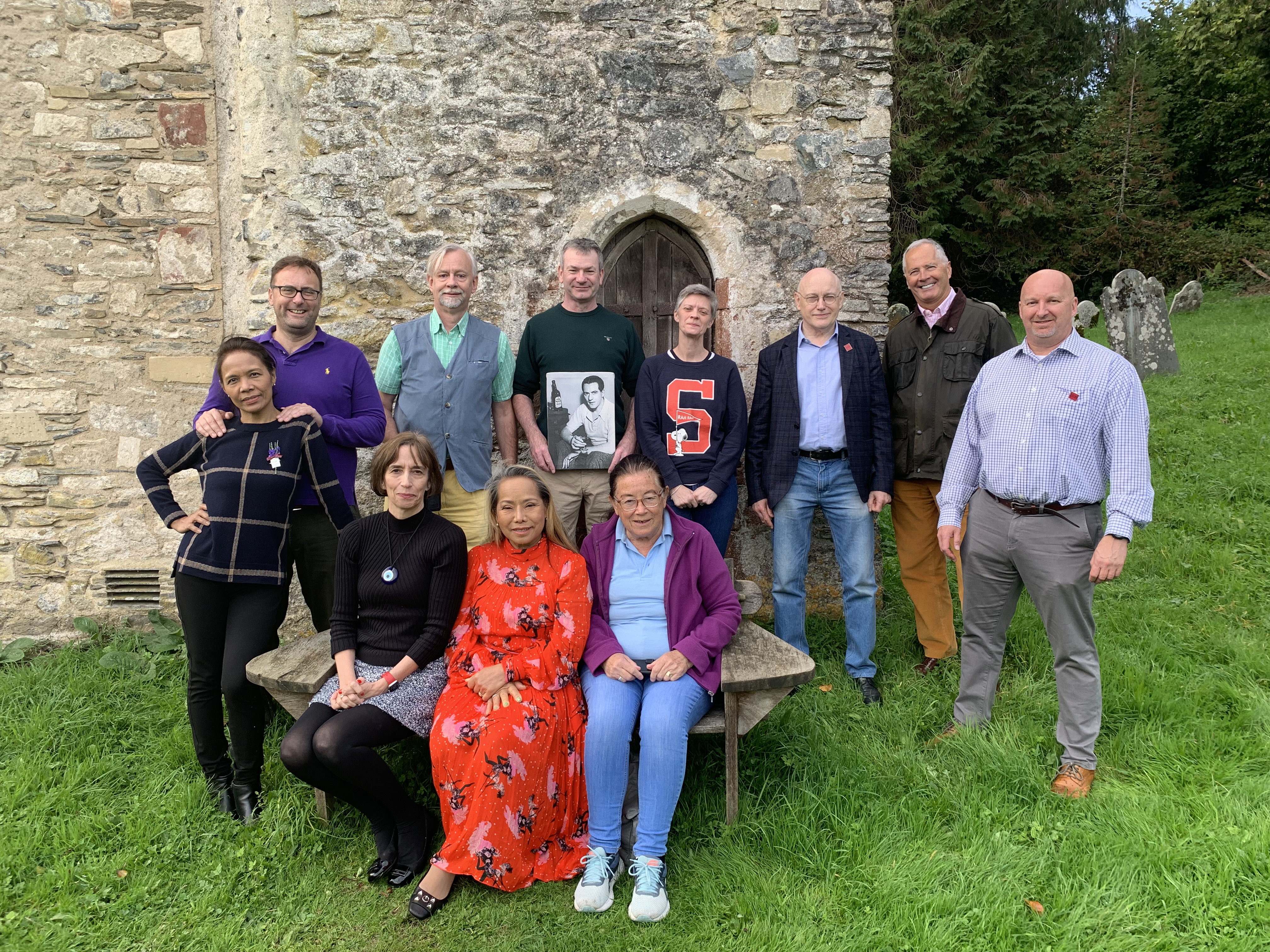
|
|
Participants (left to right): Standing: Rose, Mark, Steve, Ken, Mary, Charles, Keith, Darren. Sitting: Anna, Nat, Jean. Click on the image to enlarge |
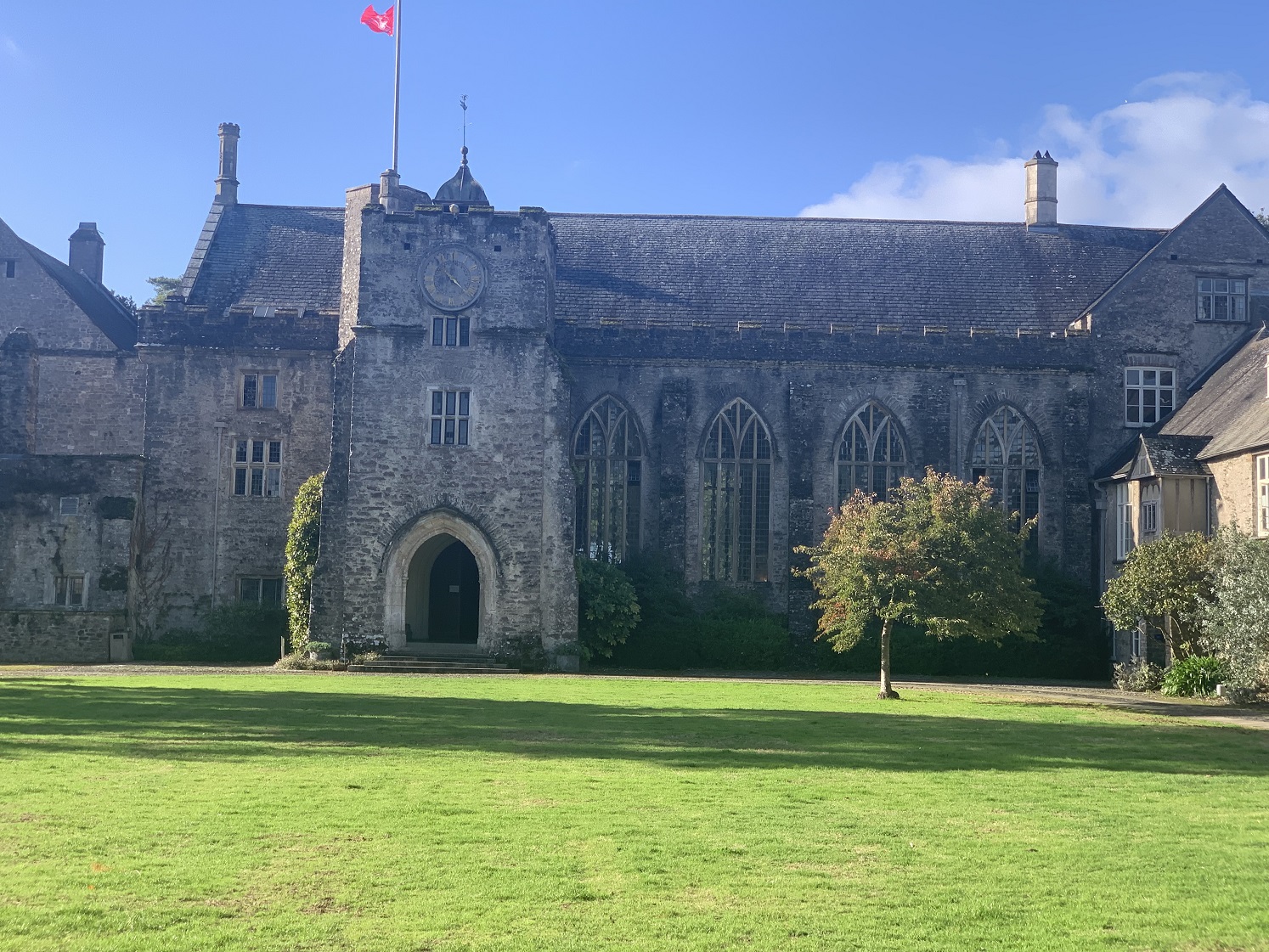
|
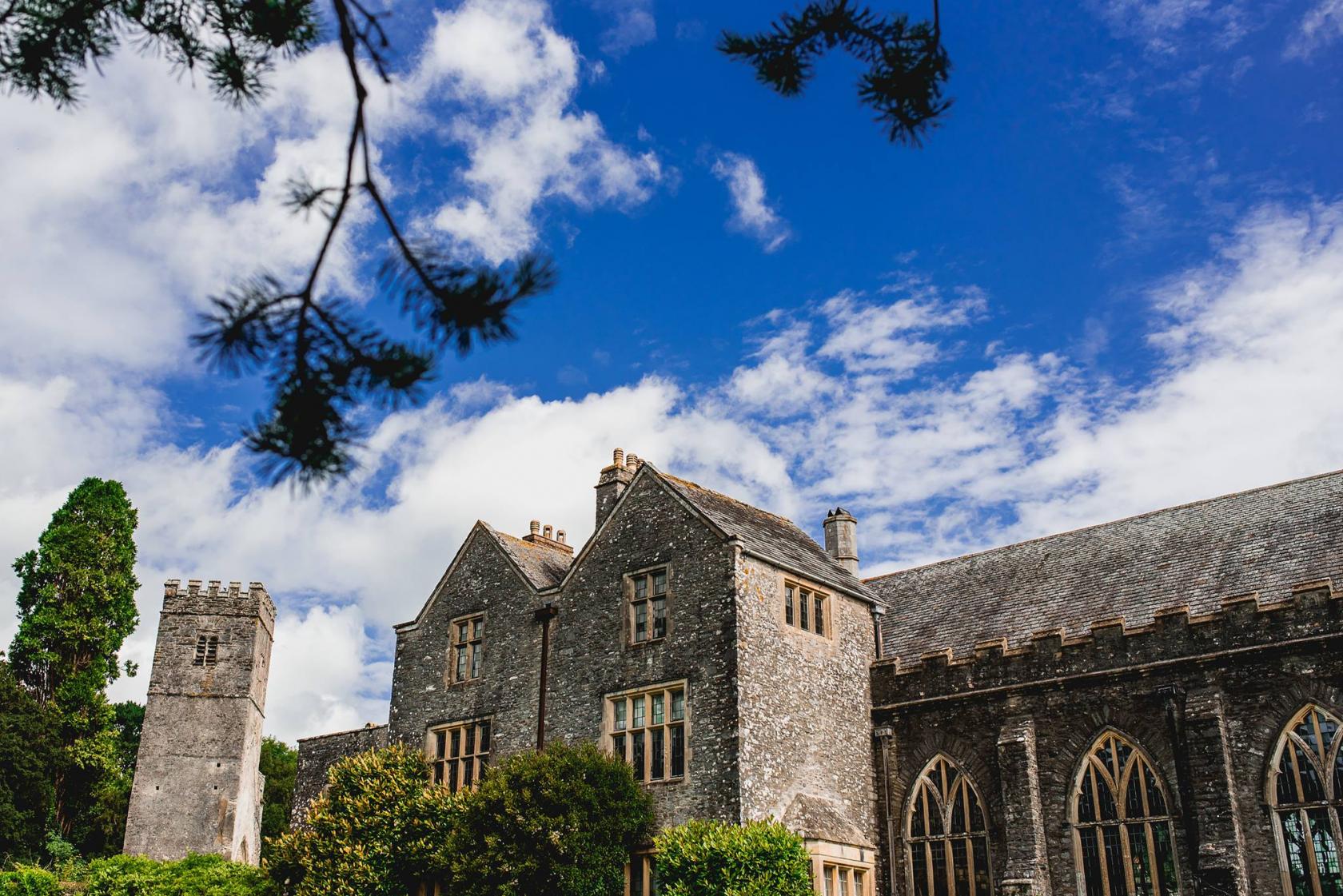
|
|
Dartington Hall: the Great Hall (left) and the rear view including St Mary’s Church Tower (right) Click on the image to enlarge |
|
The fifteenth Dennis Wheatley Convention took place on 14th-16th October at Dartington Hall, near Totnes in Devon. The venue was chosen because it was the inspiration for ‘Weylands School’, the backdrop for all the activities in ‘The Haunting of Toby Jugg’.
Being our first ‘physical’ Convention since the pandemic made this a particularly special event.
Anna performed the initial welcomes, and was our accomplished MC for the day.
Our other co-organiser, Ken G, had had crafted a Fifteenth Convention banner, very much in keeping with our traditions.
Again following our by-now established traditions, Charles brought in DW’s briefcase, containing copies of this year’s Convention programme pack. Mary supplemented this with Convention posies, which can be seen in the Convention Memorabilia section of the website.
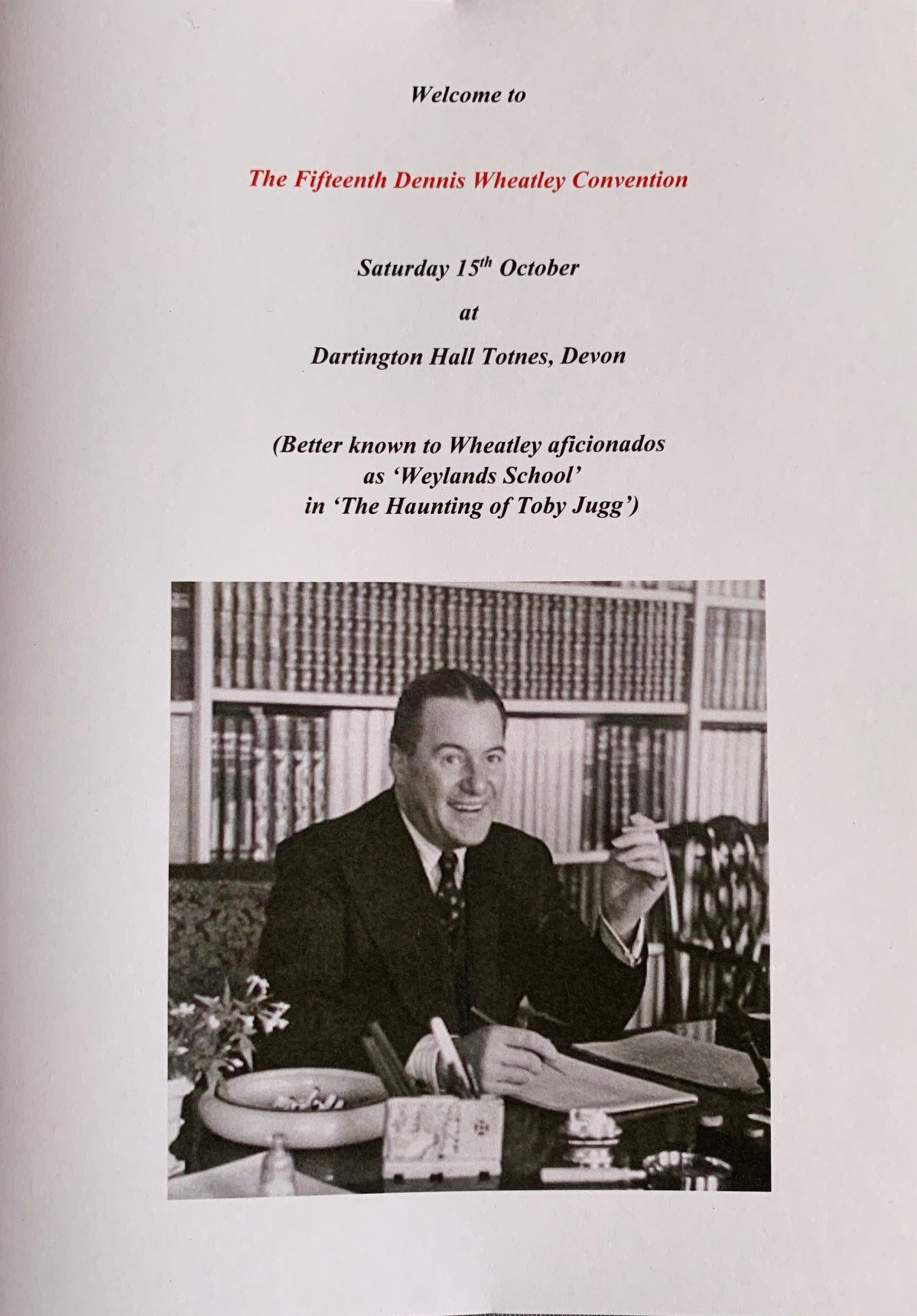
|
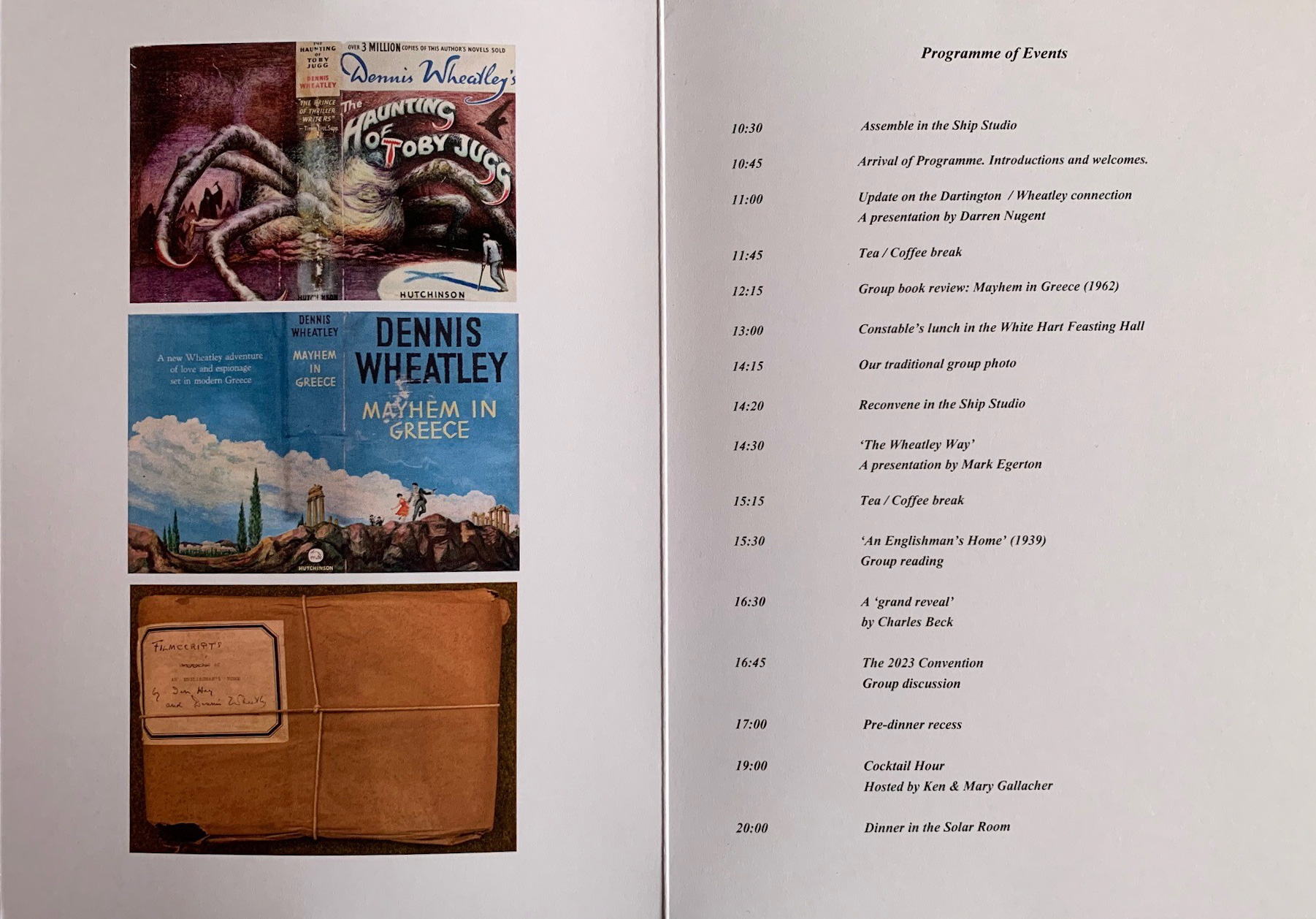
|
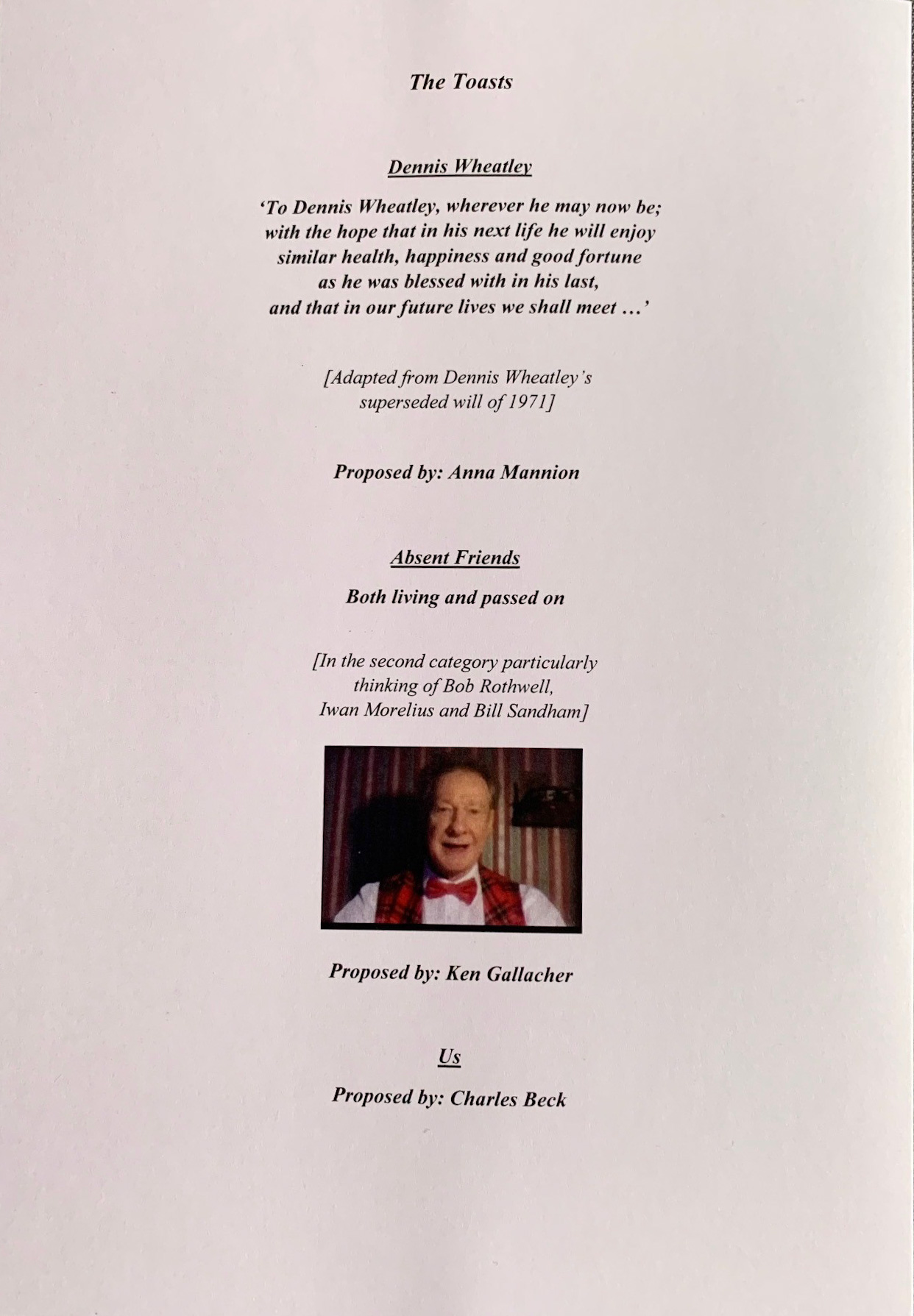
|
|
The Convention programme pack Click on the image to enlarge |
||
Anna then took everybody through the schedule for the day.
Darren started the proceedings with a toast to the memory of Bill Sandham who sadly passed away in August, our conventioneer quizmaster and a dear friend. Rest in peace, Bill.
Click on the image to enlarge
Darren then gave an update on the links between DW and Dartington Hall - a subject which he had introduced to the group at the 2014 Convention. How quickly six years have passed by - as a conventioneer observed, time goes fast when you’re having fun!
Darren recapped on his original researches, and took matters on from there.
The Manor of Dartington was referenced in the ninth century, and the Great Hall that we can see today dates from the late 1300s / early 1400s. It belonged to the family of the Duke of Exeter until the late fifteenth century, and from the sixteenth century until 1925 it was owned by Sir Arthur Champernowne and his descendants. In 1925, dilapidated, it was bought by Yorkshireman Leonard Elmhirst and Dorothy, his rich American wife. Renovated, as Darren had informed us before (to see the 2014 Convention Report, click here), it became a highly unusual school. For the seniors there was no segregation of the sexes, and sexual activity was in no way discouraged. There were no compulsory subjects (indeed, it seems nothing was compulsory at all - Aleister Crowley’s mantra of ‘Do what thou wilt shall be the whole of the Law’ would have fitted in very nicely here), the then prevalent ideas of organised games with ‘winners and losers’ and of prefects and school discipline were thrown out, and the story is told that when a visiting Mayor of Torquay once asked to see the school chapel, the headmaster, Mr Curry, simply laughed.
In 1936, an allegation associating the school with Black Magic and Aleister Crowley, made by Lady Domvile, the mother of a student at the school, was litigated against by the Elmhirsts. A settlement was reached out of Court, with a provision that Lady Domvile named the source of the rumours – this was Captain Arthur Rogers.
This was not however the end of the matter. In June 1938 the same Captain Rogers gave a highly detrimental account of the school in a meeting to both Houses of Parliament in which he spoke of nudism being the general rule and of children being brought up to dislike their parents, and in which he held that Communism was the invention of Satan; an intertwining of the two themes that DW was himself to employ both in ‘The Haunting of Toby Jugg’ and in later books such as ‘The Satanist’.
That some of these allegations were not entirely fanciful is perhaps shown by the fact that in September 1938, the headmaster from 1931 to 1957, Mr Bill Curry, was on the Committee of Honour of the World Union of Freethinkers Conference held in London in September 1938, which was nicknamed the ‘Anti-God Congress’ by some outsiders.
Captain Rogers went further in November 1938, publishing a book with the title ‘The Real Crisis’, in which he attacked Dartington Hall by name. This coincided with Maxwell Knight contacting Dennis Wheatley about the school (see below).
In his previous talk, Darren had very cleverly identified Dartington Hall as the un-named school in Devon which DW referred to in his autobiography (Drink and Ink, first edition, page 164) ‘which was co-educational and run on ultra-modern lines’ where ‘pupils were allowed complete licence’, and which he had used as the central background for an unfinished Black Magic story featuring Gregory Sallust in 1939, before taking up the theme again in his 1948 novel ‘The Haunting of Toby Jugg’.
The manuscript of the never-finished 1939 novel was the subject of the Convention’s ‘grand reveal’ in 2020.
Darren had consulted - and reproduced - an MI5 file entitled ‘Allegations of teachings of communist doctrines at Dartington Hall Co-Ed School 1932-41’ in The National Archives. Although the file had a closure notice on it until 2042 Darren had managed to consult and copy it. The final page of a key paper on Communist activity at the school and a 15-page file on Aleister Crowley are currently redacted - and that until 2023. Darren has promised to give us an update when he has learnt what that contains!
In other news since his last talk, Darren has been passed a copy of the letter in a private collection in which, on 3rd November 1938, Maxwell Knight of MI5 asked DW to continue the investigation a contact of his (possibly his stepson Bill Younger) was making of Dartington Hall - the first fully documented proof of the DW / Dartington Hall connection. With the owner’s permission, Darren put a copy of the letter on display, together with copies of the various other items he had referred to in his talk.
Just to give a few other snippets from Darren’s talk, which was sprinkled throughout with interesting facts:
All in all, this was a typically detailed and absorbing update on the DW / Dartington Hall connection by Darren, and the assembled multitude looks forward to ‘Part Three’ in due course.
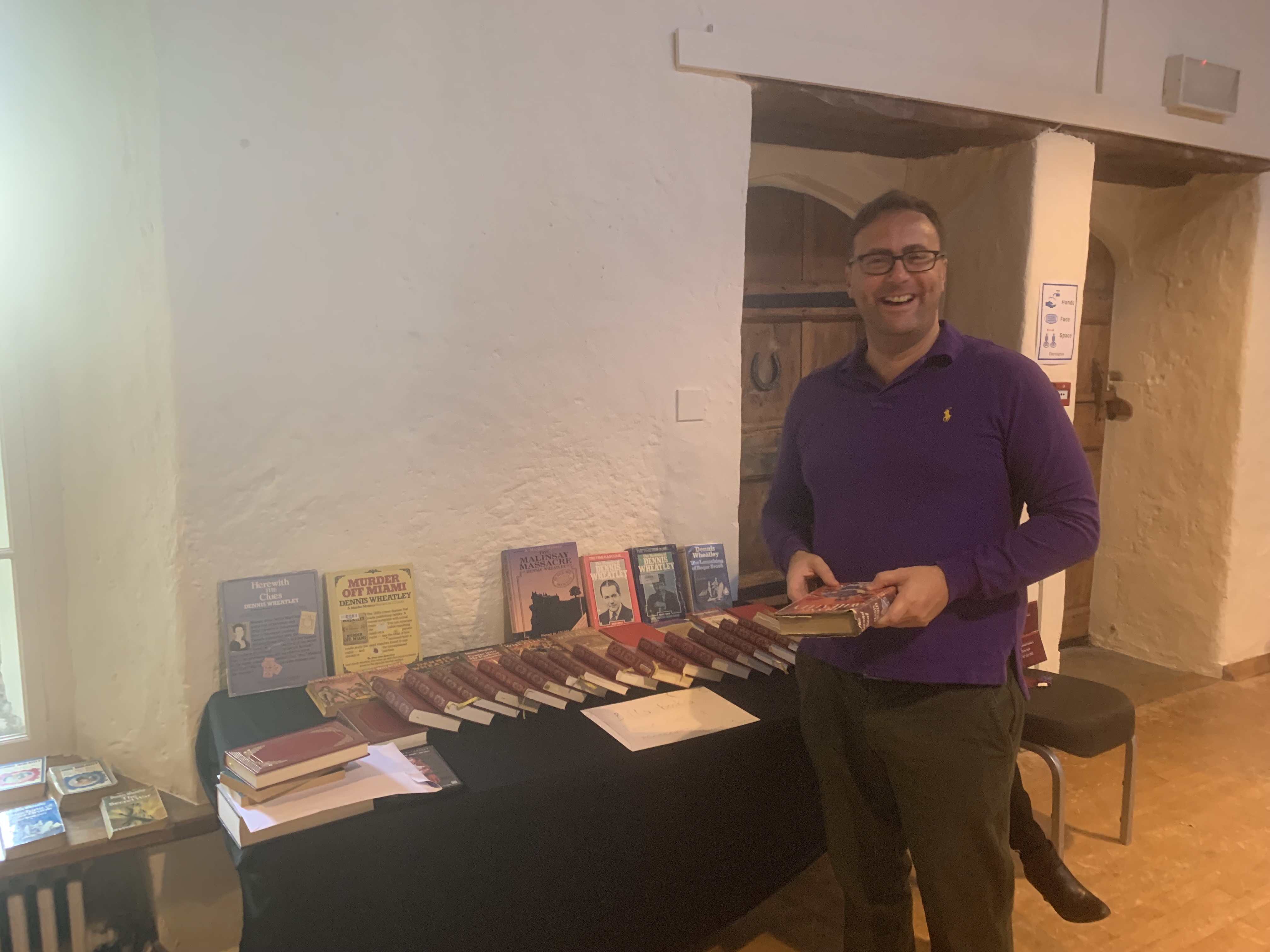
|
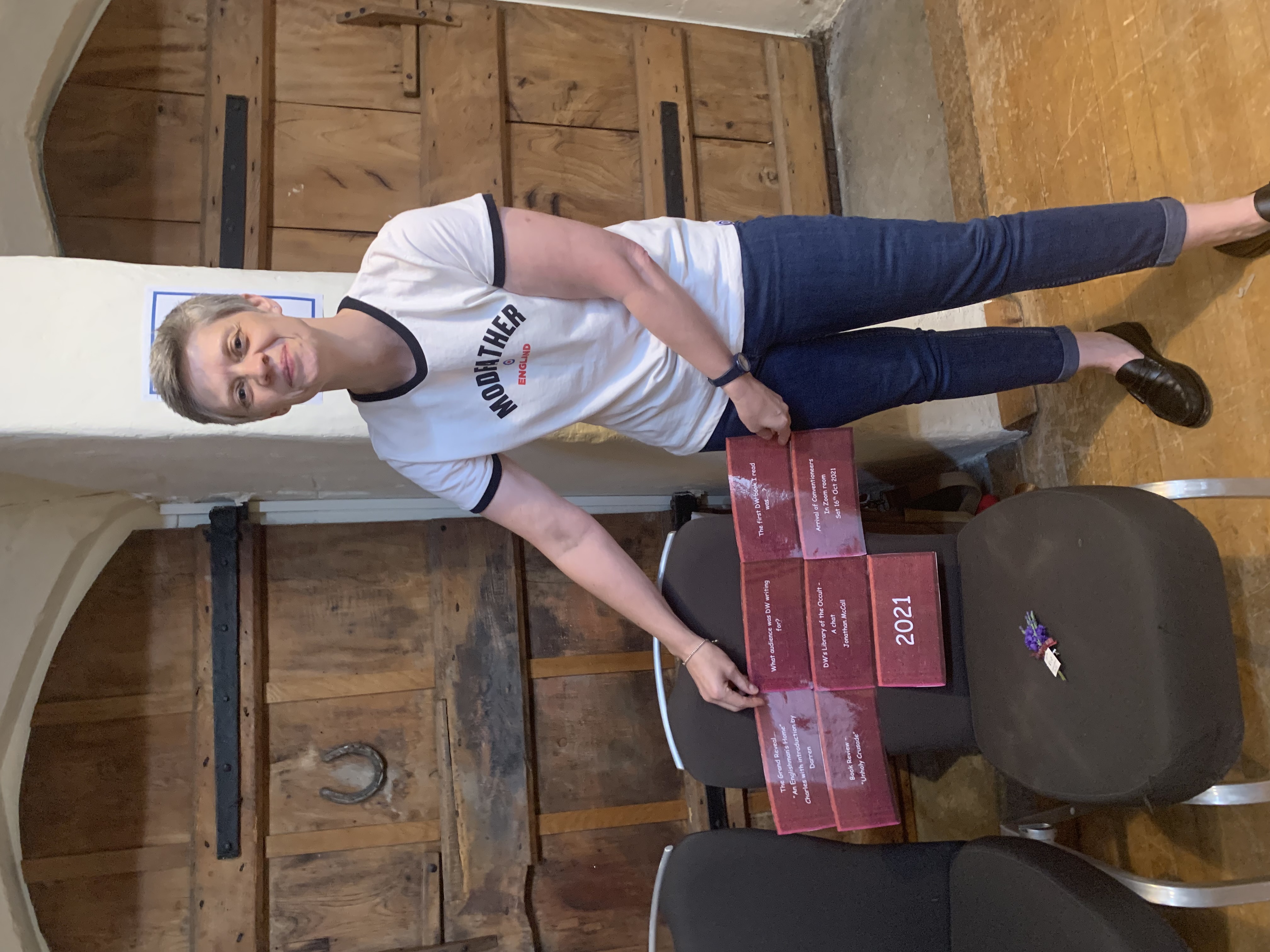
|
|
Mark with Bill’s books and (right) Mary’s wall, the 2021 update Click on the image to enlarge |
|
There then followed a tea and coffee break, a chance to look at the various exhibits, and to generally catch-up.
As a result of Mike and Ken’s fascinating comments about the book at our last (virtual) Convention, it had been decided that this year’s book for group review would be ‘Mayhem in Greece’, a one-off book of DW’s which was unusual in several respects.
First of all, it was a book in which the hero suffered from various mental disabilities (DW, somewhat unfairly, described his hero as ‘almost a half-wit’), although as Charles pointed out, he had remarkable abilities to counteract his social gauche-ness; he had a facility with languages (which Keith saw, surely correctly, as a necessary plot device), was an expert on Greek Myths, knew all about planetary alignments, learned to drive ultra-fast, was good with his fists, and had DW’s views on both reincarnation and communism. Not bad for a ‘half-wit’. Indeed, as Steve observed, Robbie had characteristics which we might perhaps now associate with a degree of autism, so perhaps the character was based at least in part on an actual acquaintance.
Anna found the mixture of romantic thriller and book on Greek Myths unsatisfactory, but Ken rather liked it, and he enjoyed DW’s humorous style of writing the latter.
DW had clearly done a great deal of research (Charles suspected that he had written two separate books, and then combined them) and the company was interested to see that at the front of the original typescript DW had listed all the Gods mentioned, and that there were over four hundred of them!
It was agreed the rape scene (at first some had not appreciated what was supposed to be going on - it was written quite vaguely) was unusual.
Ken wished Bill had been there to discuss the oil exploration, while Charles thought the book could have done with map endpapers.
Jonathan had made various observations to Anna as he was unable to attend the Convention - as usual, tall people tended to be ‘goodies’; Robbie cried rather a lot; Stephanie’s uncle was a foreign minister, and the name appeared to be a real one, and the submarine threat was a contemporary reality.
Darren commented - as he had at previous Conventions - on the apparent parallels between some DW and Stephen King novels. Darren saw similarities between ‘Toby Jugg’ and ‘Misery’, and recalled Stephen King writing about a character not entirely dissimilar to Robbie. He wondered if SK had read DW’s novels.
It was noted that the way in which Robbie rescued Stephanie at the end was similar to the way in which characters are rescued in ‘The Forbidden Territory’ and ‘The Second Seal’. The discussion about the plot device used was more specific, but I don’t want this report to give any spoilers!
Anna wondered why Robbie couldn’t tell Stephanie the real reason for his mission. Another plot device, perhaps?
Ken saw DW’s sense of humour shine forth in this novel more than in any others.
DW’s comments about ‘the eccentric people who eat their breakfasts at tables’ were noted.
There is a mention of Gregory Sallust in the book.
All-in-all, although some liked the Greek Myth chapters more than others, it was thought that while it was one of DW’s more minor out-of-series novels, it had been well worth reading.
Following Darren’s talk, the group proceeded to the White Hart Feasting Hall for a ‘Constable’s lunch’.
Following lunch, celebrating the fact that we were meeting physically again, we got a kindly (and patient!) passer-by to take the traditional group photo(s) at the base of St Mary’s Church Tower, to the west of the main courtyard. See the top of this Report for a close-up.
After lunch, Mark gave a talk on the topic of ‘The Wheatley Way’ and then acted as a facilitator for a number of very interesting discussions around related topics.
Mark began by talking about how a convention like this - by bringing together people with different ‘takes’ on a person such as DW - could move their joint understanding forward.
He then examined DW’s background, and how, having started as a wine merchant with a penchant for story-telling, after hitting a financial crisis, like Jeffrey Archer, DW took to writing and became an overnight ‘hit’.
Mark looked for traces of the wine merchant in DW’s writings. As far as those present could recall, none of DW’s characters was an actual wine merchant, but an appreciation of fine wines was present in all three of DW’s principal characters - the Duke de Richleau, Gregory Sallust and Roger Brook; and DW never lost his affection for, and wrote minor pieces for his wine merchants Justerini and Brooks.
DW’s acquaintance with aristocrats that he made when he was a wine merchant (and his clientele included among others the future King George VI) doubtless helped the budding author give character to the aristocrats in his books.
DW had a thread of connoisseurship which wove its way through many of the heroes of his books; but it was a limited form of connoisseurship - it included food and wine and literature, but excluded the likes of painting and music, which were very seldom mentioned.
Mark wondered what DW would think of the world today. His ‘Letter to Posterity’ revealed a real concern for the future, and a deep fear of the country descending into a dictatorial form of Communism, but it was clear from the way DW ended the ‘Letter to Posterity’ with an invocation to ‘The Lords of Light’ that he genuinely espoused some of the religious beliefs he wrote about in his novels.
Mark commented that DW did not have much time for organised charity. He was however clearly a compassionate man, and while he was often portrayed as right wing, Ken commented that things were not as clear-cut as that - when DW wrote about the social order in France in his Roger Brook novels, he pointed out the good and the bad points on both sides; as he did when writing ‘The Golden Spaniard’, in which he placed two of his ‘Four Musketeers’ on each of the opposing sides.
Several felt that DW believed in meritocracy, and DW’s beliefs on enfranchisement were certainly interesting - DW advocated the system devised by his fellow writer Nevil Shute under which everyone would have one vote, but that those who did special things (getting a University degree, serving in the Armed Forces, living for a time abroad …) should get more.
It was also clear - and very interesting - that DW did not write just for money. He wrote long tracts in his novels (the so-called ‘info dumps’) about history (or in the case of ‘Mayhem in Greece’, the Greek Myths) to educate his audience, and as DW wrote in a letter to Anthony Lejeune, so as to instil a belief ‘in goodness and honour, in courage and loyalty and endurance’ in his readers.
Another element of the ‘Wheatley Way’ was an appreciation of friends. Many of DW’s novels centred around loyalty and friendships, and in many ways DW himself was defined by his friendships. Someone observed that if you looked at the calibre of DW’s friends, (senior figures in the Intelligence services, serious writers and some of the most important military figures of World War II), it said much of him as a person; such people would not have chosen their close friends lightly.
The multi-faceted conversation which Mark initiated was a fascinating one, and there was a general consensus that it should be continued.
There then followed another tea and coffee break, which gave an opportunity to see some of the further exhibits put on display.
After lunch, there was a group reading of DW’s original film script for ‘An Englishman’s Home’ - almost certainly the first time that this has ever been read out in public.
Before the reading, Darren give the group a brief reminder of its origins.
This film script - which had been the subject of the ‘grand reveal’ at last year’s virtual Convention - had its origins in a play called ‘The Patriot’ by Guy du Maurier, which caused a sensation when it was first performed in 1909, the subject matter being the invasion of Great Britain. The play was made into a silent film in 1914, and was made into a talking film in 1939, and it was with this that DW had involvement. Darren concluded his introduction by reading out from a recently discovered document what DW himself said about the origins of the play.
It included the following, rather wonderful description of Albert de Courville, who was to direct the film:
‘All I knew of him was that during the First World War he had put on a number of vaudeville shows, so was a good picker of chorus girls’ legs. That did not seem to be much of a qualification for directing a thriller film, and my surprise at his having been chosen became amazement after we had been talking for ten minutes.’
DW concluded his account by saying that ‘de Courville hashed up [the film] from a mixture of Hay, Knoblock and Wheatley with additions of his own.’
A group of those present then read out DW’s original film script, each reading a page in turn, much to the enjoyment of all.
Click on the images to enlarge
Shown in the penultimate photo are (clockwise from top left) DW’s special copy of Tre Decennier,
DW’s giant photo album of Grove Place, the part MS of Julie’s Lovers, the typescript of Julie’s Lovers,
DW’s notebook giving details of his submissions of his earliest work, and a photo album for Clinton (mis-spelt Cinton) House.
For this year’s ‘grand reveal’, Charles bought along for the group to see some of the important DW material that had come up for sale in a big cardboard box at a London auction house in January 2020. It had been bought by a DW enthusiast so that it could be safely preserved.
The box contained fourteen items, of which Charles’ favourites were a huge photograph album of Grove Place bound in DW’s signature armorial binding, which displayed DW’s huge affection for the mansion he lived at in Lymington between 1945 and 1968; the copy of ‘Tre Decennier’ that Iwan Hedman / Morelius and Jan Alexandersson presented to DW in 1963. It was one of only four copies of this first edition of their bibliography, and DW wrote inside it that ‘The time and care that must have gone into the making of this beautiful production is, perhaps, the greatest compliment that has ever been paid to my work.’; some interesting notebooks; and - perhaps most significantly - the typescript and part of the manuscript of ‘Julie’s Lovers’.
For those not immediately familiar with it, Charles explained that ‘Julie’s Lovers’ was the first full-length novel that DW ever wrote - DW wrote it as a twenty-year-old, partly on the Front in World War One, and partly when he was back in the U.K, recuperating after having been gassed.
DW’s father was so impressed by it that he had it typed-up and submitted to Cassells, who refused it. By then DW was so busy learning the wine trade and immersing himself in having a good time with his unscrupulous friend Eric Gordon Tombe that he didn’t submit it elsewhere for publication, and although it was known that DW had the typescript in his library in the 1960s, it had since disappeared from view. This was therefore a very important find.
To celebrate its rediscovery, with the kind permission of Dominic Wheatley, Charles had re-typed it while in quarantine in a hotel-cum-prison in Thailand at the height of the pandemic (his briefcase didn’t leave his sight while he was travelling), and was now publishing it in a special limited edition for supporters of the Dennis Wheatley website.
Charles handed copies to those attending the Convention, and it was agreed that ‘Julie’s Lovers’ should be the topic of next year’s group book review.
There then followed a discussion of where participants would like the next Convention, and of what might go in it. It was agreed that if Elstree had completed its renovations it might be suitable, otherwise a return to Dartington Hall would be extremely nice. It was not easy to find a date which suited everyone, but Saturday 21st October 2023 was a date which all those present could make.
What might go in the agenda was also discussed.
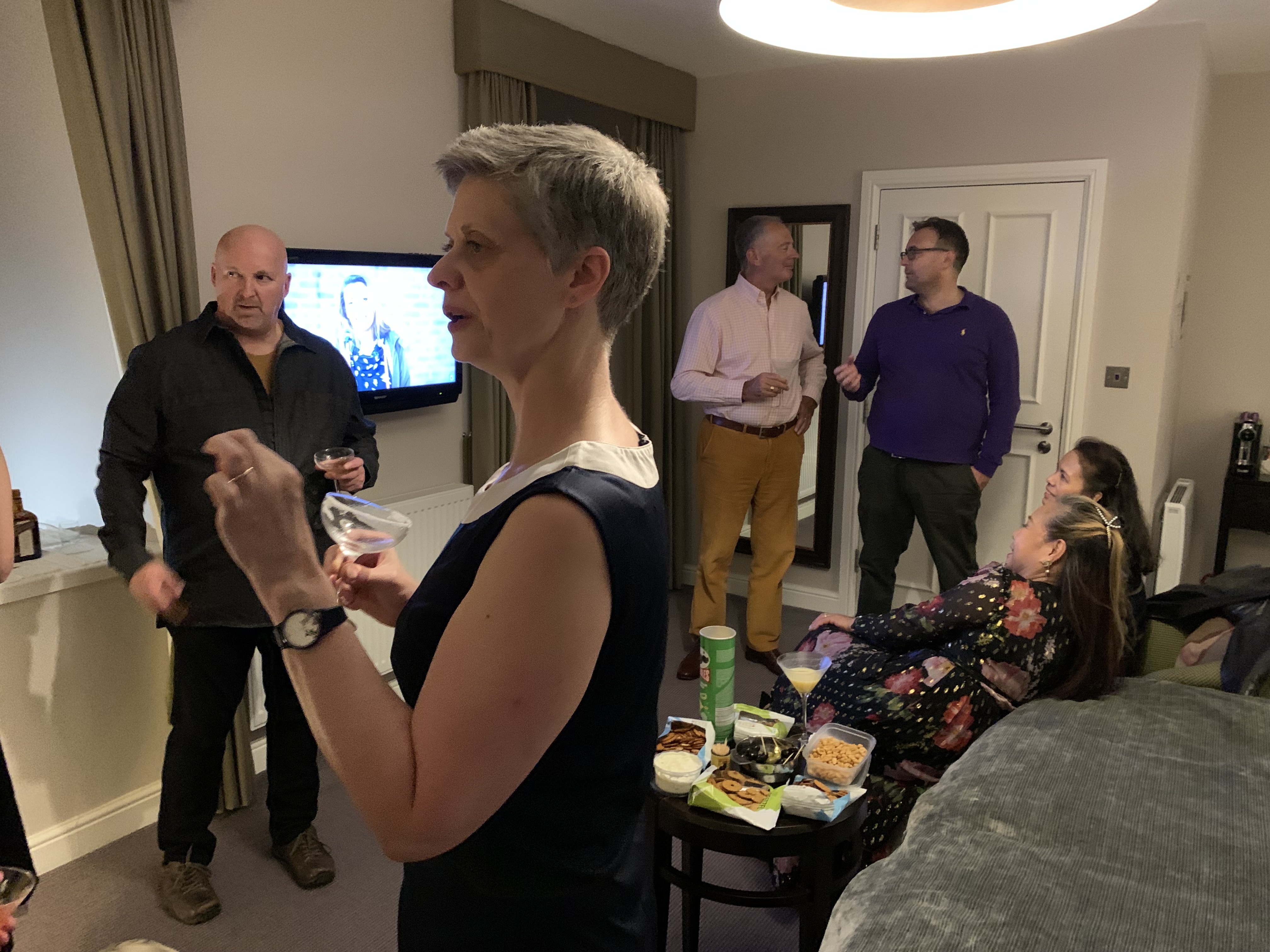
|
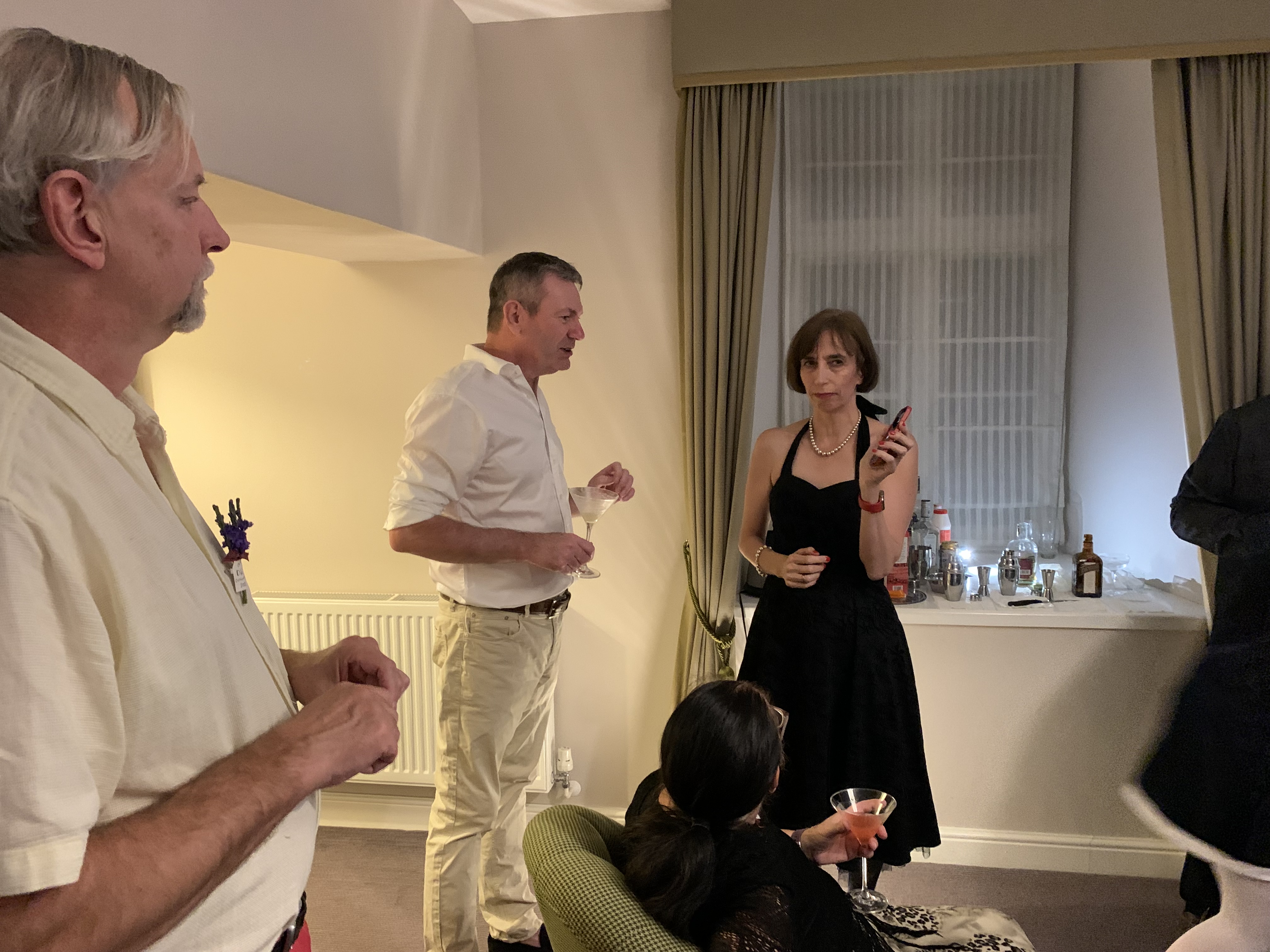
|
|
Ken & Mary’s Cocktail Party Click on the image to enlarge |
|
After a break, the group re-assembled at 7 p.m. for Ken and Mary’s cocktail party, where they were regaled with the usual selection of cocktails and other drinks which the couple had brought down for everyone to enjoy. Everyone was thrilled when Bill’s brother John made a brief appearance on Anna’s phone via Zoom.
The cocktail party was followed by dinner in the Solar Room, during which the conversation ranged widely from matters concerning DW to the group’s favourite non-DW books, to life, music and beyond. DW would surely have been delighted at the vast array of knowledge on all sorts of topics on easy display.
Following the dinner came the toasts. Anna came first, proposed the toast to Dennis Wheatley.
Ken then proposed the toast to ‘Absent friends - both living and passed on’, and here we especially thought of Bill Sandham, one of the most eminent and irrepressible members of our group, who passed away in August. While we celebrated his life, which was full of achievements of many different kinds - academic, charitable, sporting and musical - we all agreed he would be very sadly missed, and our thoughts went out to his family and friends, some of whom we had had the pleasure of welcoming to our Conventions.
Charles then proposed the final toast, which was to those of us present.
The group breakfasted and departed on the following day, and they was a general consensus that we had had a marvellous time.
We look forward to doing something similar in 2023.
Charles B.
Nov 2022
This page last updated Copyright © 2002-2006 Bob Rothwell. 2007-2026 Charles Beck.